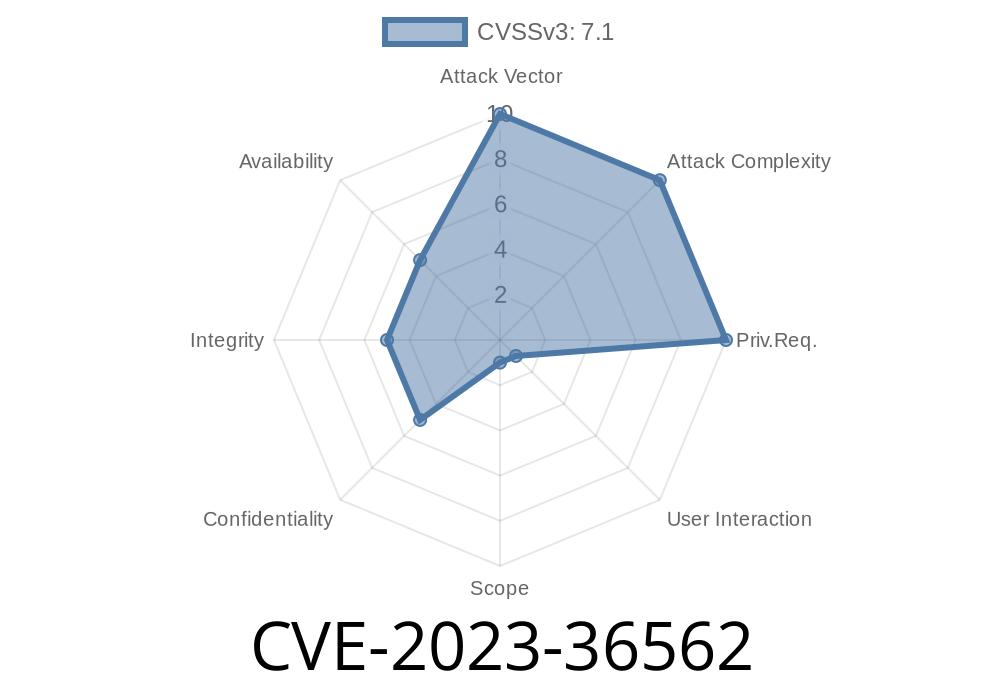In late 2023, security researchers uncovered a critical vulnerability in the Microsoft Edge Chromium-based browser, officially titled CVE-2023-36562. If you administer Windows environments, develop extensions, or are simply interested in browser security, you should understand what this flaw is, how it can be exploited, and what you can do to protect your systems.
This article breaks down the vulnerability, explores its impact, shares a practical exploitation scenario, and walks you through mitigation. Whether you’re new to browser security or a seasoned pro, this exclusive explainer is for you.
What is CVE-2023-36562?
CVE-2023-36562 is an Elevation of Privilege (EoP) vulnerability found in the Microsoft Edge browser, which leverages the Chromium engine. Essentially, this flaw allows a malicious actor to gain higher privileges on a target system, usually moving from a restricted browser sandbox to greater control within Windows.
Severity: High (CVSS score: 7.8)
- Microsoft Advisory: MSRC CVE-2023-36562
How Does This Vulnerability Work?
Microsoft Edge runs web content in sandboxed processes to limit damage from malicious sites. CVE-2023-36562 is triggered by mishandled privileges inside a browser process. By exploiting this bug, attackers can break out of the browser sandbox and execute code at a higher privilege level, often as the logged-in user.
Microsoft’s official summary of the bug states
> “An elevation of privilege vulnerability exists when Microsoft Edge (Chromium-based) fails to properly handle objects in memory.”
Trick a victim into visiting a specially crafted website,
2. Use a chain of exploits—starting with a renderer exploit to execute code, followed by the EoP bug to escape the sandbox.
Here’s a basic proof-of-concept outline. While Microsoft and most security vendors don’t release “weaponized” exploits for active vulnerabilities, here’s a simplified approach using code to illustrate the kind of logic attackers leverage.
Code Snippet: Abusing Privilege Escalation (Pseudocode)
// Pseudocode simulating exploitation of a sandbox escape (not a working exploit)
const vulnerableFunction = (input) => {
// Normally, this function should never access high-privilege APIs
if (input.isMalicious) {
// Trigger the bug: Escalate privileges
// In reality, this may corrupt memory or manipulate callback pointers
escalatePrivileges(); // Dangerous, should not be reachable!
}
};
// Attacker-controlled input
let evilInput = { isMalicious: true };
vulnerableFunction(evilInput); // Now running with elevated privileges!
Note: In real-world attacks, adversaries use memory corruption, custom DLL injection, or specially crafted JavaScript triggers. This pseudocode is for learning only.
Patched: October 2023 (Patch Tuesday)
- Technical Details: The vulnerability involves improper object handling in the browser’s main process. After gaining code execution in the renderer, attackers exploit this bug to hijack a privileged function pointer, escaping the sandbox.
For those interested in the technical deep dive, see Chromium’s bug tracker entry by Microsoft
- Chromium Issue #1485747 *(may be restricted)*
How to Protect Yourself
Microsoft’s Official Patch:
Updates for Microsoft Edge resolve this vulnerability by correcting how objects are handled in memory across privilege boundaries. The patch was released in version Edge 118..2088.46 and above.
Update Microsoft Edge: Go to Settings > About Microsoft Edge to check for updates.
- Deploy security patches: Enterprise users should use WSUS or Group Policy to ensure users get updates.
More Reading and References
- Microsoft’s CVE-2023-36562 Advisory
- Security Update Release Notes
- Chromium Security Blog
Conclusion
CVE-2023-36562 is a reminder that even modern browsers aren’t immune from old-school privilege escalation bugs. Keeping browsers and all software patched is your biggest weapon against threats like this.
Stay up-to-date, and always be wary of suspicious links—even in trusted web browsers.
*This article is an exclusive, simplified breakdown for tech administrators and security hobbyists. If you have questions about this or similar vulnerabilities, let us know in the comments!*
Timeline
Published on: 09/15/2023 22:15:13 UTC
Last modified on: 09/21/2023 14:14:05 UTC
